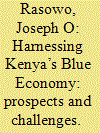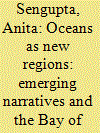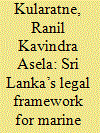|
|
|
Sort Order |
|
|
|
Items / Page
|
|
|
|
|
|
|
| Srl | Item |
| 1 |
ID:
175422


|
|
|
|
|
| Summary/Abstract |
The article explores stakeholder participation in marine spatial planning with particular reference to Bangladesh, a country which has committed to developing such an ocean management approach but remains at an early stage in the process. A contextual overview of the marine environment, resources and economic activities within the maritime areas of Bangladesh is provided. Definitions and concepts of marine spatial planning are critically discussed and the need to identify and understand the roles, expectations and interests of diverse stakeholders to deliver successful implementation emphasised. An overview and synthesis of a survey of maritime stakeholders in Bangladesh is provided with a view to enhancing understanding of their engagement processes, relationships and conflicts. Recommendations to reconcile conflicting uses and help facilitate the development of marine spatial planning in Bangladesh and potentially the Bay of Bengal more widely.
|
|
|
|
|
|
|
|
|
|
|
|
|
|
|
|
| 2 |
ID:
175423


|
|
|
|
|
| Summary/Abstract |
Kenya enjoys a marine coastline of about 640 km giving a total area of territorial waters of 9700 km2 while the EEZ is 142,400 km2. She further lays claim to an extended EEZ of approximately 103,320 km2 and has 13,600 km2 of inland waters. The government recognizes the potential of this maritime resource to boost the country’s economic outlook and has made Blue Economy (BE) part of the economic pillar in its development blueprint. For effective development of the BE, Kenya needs, among other things, to: build human resource capacity through investing in marine education and training; boost marine scientific research; support the traditional industries of fisheries, aquaculture, tourism, blue biotechnology, ports and shipping; develop BE database; resolve outstanding boundary disputes; and reduce illegal unreported and unregulated fishing. The study posits that Kenya already has sector-wise experiences and assets as demonstrated by the numerous government institutions participating in the BE and is only lacking policy integration, coordination and coherence.
|
|
|
|
|
|
|
|
|
|
|
|
|
|
|
|
| 3 |
ID:
175425


|
|
|
|
|
| Summary/Abstract |
Socio-economic security has motivated African states to explore natural resources in areas of overlapping maritime claims. However, Africa’s maritime boundaries are characterized by unresolved disputes. Resolution of these disputes is time-consuming, expensive and can undermine the state’s ability to exploit natural resources. The Somalia and Kenya maritime dispute under litigation with the International Court of Justice demonstrates the continental commitment to peaceful resolution. Citing cases from across Africa, we discuss outright delimitation or Joint Management Zones (JMZs) as means to address disputes over shared resources, particularly transboundary fisheries, which have received little attention. Reframing the Kenya-Somalia maritime dispute resolution process as cooperation over fisheries management will have spill-over effects into greater diplomatic relations. Fish do not abide by maritime boundaries. As such, we posit that the peaceful resolution of maritime boundary disputes lies in Africa’s ability to consider settlements by way of JMZs to motivate sustainable use of natural resources.
|
|
|
|
|
|
|
|
|
|
|
|
|
|
|
|
| 4 |
ID:
175420


|
|
|
|
|
| Summary/Abstract |
Traditionally geo-political spatial imaginations have been restricted to the continental expanse with the understanding that oceans formed the shared commons. However, he delimitation of oceanic spaces as ‘natural regions’ is therefore increasingly becoming as significant today to strategic discourse as continental spaces and subject to similar terminological transformations. This article argues that the emergence of a common narrative built around historical interactions along sea lanes, the re-conceptualization of ocean spaces and the increasing recognition of the significance of ‘Blue Economy’ calls for a critical understanding of ocean spaces. In the twenty-first century this has become a structural component of international politics expanding into a wider array of policy fields in a way that was seldom evident even in the last decade of the previous century, when the mapping of oceans assumed critical political relevance. In this background, this article examines the emergence of the Bay of Bengal as a ‘new’ region with associated regional organizations.
|
|
|
|
|
|
|
|
|
|
|
|
|
|
|
|
| 5 |
ID:
175424


|
|
|
|
|
| Summary/Abstract |
As marine ecosystems decline globally, scientists recommend increasing the coverage of marine protected areas (MPAs), but many are not effectively managed to deliver benefits. Community integration into decision-making can increase effectiveness by supporting behavior change, but this poses implementation challenges. We examine differences in adaptive capacity, community engagement, and perceived MPA benefits using interviews and focal groups in two fishing communities from MPAs with different management strategies and geographic settings: a centrally managed MPA in Kenya and a co-managed MPA in Tanzania. Far fewer Kenyan community members (37%) felt they benefited from the MPA compared to Tanzanian community (95%). Agency, trust, and MPA support were largely similar. Both systems had challenges that reduced collaborative action including: low staff-community interaction and communication, leadership challenges, and social conflict. We identified pathways towards improved co-management that transcend systems: institutional prioritization of community integration, investment in community leadership, mapping social networks, and adequate MPA budgets.
|
|
|
|
|
|
|
|
|
|
|
|
|
|
|
|
| 6 |
ID:
175421


|
|
|
|
|
| Summary/Abstract |
This article provides an assessment of the efficiency and efficacy of Sri Lanka's legislation Marine Pollution Prevention Act No. 35 of 2008 (administered by the Marine Environmental Protection Authority/MEPA), for protecting Sri Lankan waters from pollution. Although there are provisions to control pollution - from ships, harbors/ports, any facility used by ships and offshore petroleum exploration projects - and to deal with offences, imposing both criminal and civil liabilities for offenders, there are some serious loopholes. This includes failure to address land-based pollution sources, unclear provisions for ballast water disposal and no consideration for pollution from other offshore projects, etc. The Act requires significant amendments considering the international conventions pertaining to marine pollution control, both ratified and unratified by Sri Lanka. The success of amending the Act must also be monitored by MEPA with other government agencies implementing the international instruments dealing with marine environmental monitoring ratified by Sri Lanka.
|
|
|
|
|
|
|
|
|
|
|
|
|
|
|
|
|
|
|
|
|